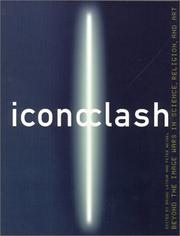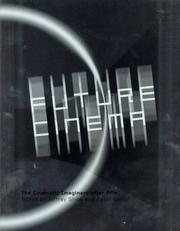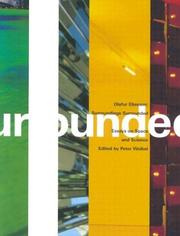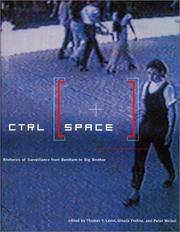
ISBN: 026262172X 9780262621724 Year: 2002 Publisher: Karlsruhe ZKM
Abstract | Keywords | Export | Availability | Bookmark
 Loading...
Loading...Choose an application
- Reference Manager
- EndNote
- RefWorks (Direct export to RefWorks)
An examination of the role of images in cultural conflicts and of alternatives to Western ways of thinking about image creation and image destruction.This book, which accompanies a major exhibition at the Center for New Art and Media (ZKM) in Karlsruhe, Germany, invokes three disparate realms in which images have assumed the role of cultural weapons. Monotheistic religions, scientific theories, and contemporary arts have struggled with the contradictory urge to produce and also destroy images and emblems. Moving beyond the image wars, ICONOCLASH shows that image destruction has always coexisted with a cascade of image production, visible in traditional Christian images as well as in scientific laboratories and the various experiments of contemporary art, music, cinema, and architecture. While iconoclasts have struggled against icon worshippers, another history of iconophily has always been at work. Investigating this alternative to the Western obsession with image worship and destruction allows useful comparisons with other cultures, in which images play a very different role. ICONOCLASH offers a variety of experiments on how to suspend the iconoclastic gesture and to renew the movement of images against any freeze-framing. The book includes major works by Art & Language, Willi Baumeister, Christian Boltanski, Daniel Buren, Lucas Cranach, Max Dean, Marcel Duchamp, Albrecht Dürer, Lucio Fontana, Francisco Goya, Hans Haacke, Richard Hamilton, Young Hay, Arata Isozaki, Asger Jorn, Martin Kippenberger, Imi Knoebel, Komar & Melamid, Joseph Kosuth, Gordon Matta-Clark, Tracey Moffat, Nam June Paik, Sigmar Polke, Stephen Prina, Man Ray, Sophie Ristelhueber, Hiroshi Sugimoto, and many others.
hedendaagse kunst --- Contemporary [style of art] --- Aesthetics. --- Image (Philosophy) --- Iconoclasm. --- Thema's in de kunst, religie en wetenschap ; beeldvorming --- Beeldvorming ; representatie en functie ; in kunst en maatschappij --- Iconoclash --- Tentoonstellingscatalogi ; Karlsruhe ; Center for Art and Media ; ZKM --- 7.04 --- (069) --- edited by Bruno Latour and Peter Weibel --- kunst --- 246.3 --- kunst en technologie --- kunst en wetenschap --- wetenschap --- technologie --- religie --- kunst en religie --- iconografie --- iconoclasme --- boeddhisme --- islam --- politiek --- kunst en politiek --- film --- video --- videokunst --- lijkwade van Turijn --- zweetdoek van de H. Veronica --- kunsttheorie --- iconologie --- Paik Nam June --- Sugimoto Hiroshi --- Isozaki Arata --- Milano Triennale 68 --- Breitz Candice --- video-installaties --- muziek --- kunst en muziek --- Ristelhueber Sophie --- 791.5 --- 7.038 --- 7.03 --- 130.2 --- Iconografie --- (Musea. Collecties) --- Beelden in kerken. Beeldenverering. Iconoclasme --- Iconografie. Iconologie. Onderwerpen van kunstzinnige uitbeelding --- Exhibitions --- 7.04 Iconografie. Iconologie. Onderwerpen van kunstzinnige uitbeelding --- 246.3 Beelden in kerken. Beeldenverering. Iconoclasme --- Image (Philosophy). --- Aesthetics --- Iconoclasm --- Philosophy --- Idols and images --- Beautiful, The --- Beauty --- Esthetics --- Taste (Aesthetics) --- Art --- Criticism --- Literature --- Proportion --- Symmetry --- History --- Worship --- Psychology --- Art [Modern ] --- 20th century --- Themes, motives --- ZKM, Center for Art and Media (Karlsruhe, Germany ) --- Esthétique --- Image (Philosophie) --- Iconoclasme --- Radio broadcasting Aesthetics --- icons [devotional images]

ISBN: 0262692864 Year: 2003 Publisher: Cambridge, Mass. MIT
Abstract | Keywords | Export | Availability | Bookmark
 Loading...
Loading...Choose an application
- Reference Manager
- EndNote
- RefWorks (Direct export to RefWorks)
Edited by Jeffrey Shaw and Peter Weibel --- digitale kunst --- computerkunst --- Nekes Werner --- scenografie --- Radok Emil --- Radok Alfred --- Svoboda Josef --- Marker Chris --- Anger Kenneth --- bioscopen --- VanDerBeek Stan --- Themerson Stefan --- Vasulka Steina --- Vasulka Woody --- Lye Len --- Deren Maya --- Richter Hans --- Le Grice Malcolm --- Brakhage Stan --- Weibel Peter --- Rybczynski Zbigniew --- Jost Jon --- Hersman Leeson Lynn --- Hoberman Perry --- Dove Toni --- Arnold Martin --- Ruhm Constanze --- Barba Rosa --- Stracke Caspar --- McCoy Jennifer --- McCoy Kevin --- Campbell Jim --- Weinbren Grahame --- Cathcart James --- Davenport Glorianna --- Friedlander Larry --- Barry Barbara --- Galyean Tinsley --- Bradley Brian --- Scott Jill --- Ahtila Eija-Liisa --- Julien Isaac --- Crandall Jordan --- Hales Chris --- Norrie Susan --- Hill Gary --- Legrady George --- Comella Rosemary --- Seaman Bill --- Hegedüs Agnes --- Howard Ian --- Klein Norman M. --- Kratky Andreas --- O'Neill Pat --- Labyrinth Project --- Forgács Péter --- Manovich Lev --- Cornwell Peter --- Shaw Jeffrey --- Bruyère Jean Michel --- LFK-lafabriks --- Boissier Jean-Louis --- Ziegler Christian --- Fujihata Masaki --- Jaschko Susanne --- Sauter Joachim --- Lüsebrink Dirk --- Egg Daniel --- Reinhart Martin --- Widrich Virgil --- Medlin Margie --- Maire Julien --- Beloff Zoe --- Oursler Tony --- Naimark Michael --- Barry Judith --- Blast Theory --- Courchesne Luc --- Del Favero Dennis --- de Nijs Marnix --- Sims Karl --- Deussen Oliver --- Lintermann Bernd --- Eshkar Shelley --- Kaiser Paul --- Lafia Marc --- Fire Didi --- Wisniewski Maciej --- Johnson Paul --- Napier Mark --- Speckenbach Jan --- Weiberg Birk --- Fürstner Thomas --- Heide Axel --- Pocock Philip --- Stehle Gregor --- Benayoun Maurice --- Schmid Michael --- Müller-Quade Jörn --- Beth Thomas --- 791.45 --- Film --- Digital cinematography --- Technology and the arts --- media --- multimedia --- Paik Nam June --- precinema --- Snow Michael --- Vertov Dziga --- video --- videokunst --- voorgeschiedenis film --- 7.038/039 --- 791.43 --- 791.5 --- Buñuel Luis --- Cardiff Janet --- computers --- computerspellen --- Cornell Joseph --- cybercultuur --- Dean Max --- Deleuze Gilles --- digitale film --- experimentele film --- Export Valie --- film --- filmgeschiedenis --- filmtheorie --- games --- Graham Dan --- Huyghe Pierre --- installaties --- Kentridge William --- Klein Norman M --- kunst --- kunst en technologie --- kunsttheorie --- Arts and technology --- Cinematography --- Digital filmmaking --- Digital moviemaking --- Digital techniques --- Arts

ISBN: 0262731487 Year: 2000 Publisher: Cambridge, Mass. MIT
Abstract | Keywords | Export | Availability | Bookmark
 Loading...
Loading...Choose an application
- Reference Manager
- EndNote
- RefWorks (Direct export to RefWorks)
Art --- Iconography --- art [fine art] --- landscapes [representations] --- Eliasson, Olafur --- anno 1900-1999 --- anno 2000-2099 --- Denmark --- Edited by Peter Weibel --- ruimtelijkheid --- 7.071 ELIASSON --- Art and science --- Site-specific installations (Art) --- Space and time --- architectuur --- Eliasson Olafur --- installaties --- kunst --- kunst en technologie --- kunst en wetenschap --- kunsttheorie --- openbare ruimte --- stedenbouw --- twintigste eeuw --- Space of more than three dimensions --- Space-time --- Space-time continuum --- Space-times --- Spacetime --- Time and space --- Fourth dimension --- Infinite --- Metaphysics --- Philosophy --- Space sciences --- Time --- Beginning --- Hyperspace --- Relativity (Physics) --- Installations (Art) --- Site-specific art --- Science and art --- Science --- Olafur Eliasson, --- Elíasson, Ólafur, --- Ólafur Elíasson --- Elíasson, Ólafur --- art [discipline]
Book
ISBN: 9780262044455 0262044455 Year: 2020 Publisher: Cambridge, Mass. The MIT Press
Abstract | Keywords | Export | Availability | Bookmark
 Loading...
Loading...Choose an application
- Reference Manager
- EndNote
- RefWorks (Direct export to RefWorks)
Ce volume monumental, tiré d'une exposition du Centre d'art et des médias du ZKM en 2020, décrit la désorientation de la vie dans un monde confronté au changement climatique. Il retrace cette désorientation à la déconnexion entre deux définitions différentes de la terre sur laquelle vivent les hommes en voie de modernisation : la nation souveraine dont ils tirent leurs droits, et une autre, cachée, dont ils tirent leurs richesses : la terre sur laquelle ils vivent, et la terre dont ils vivent. En traçant la carte de la terre qu'ils vont habiter, ils ne trouvent pas un globe, ni le fameux "marbre bleu", mais une série de zones critiques - inégales, hétérogènes, discontinues. Avec de courtes pièces, des essais plus longs et plus de 500 illustrations, les contributeurs explorent le nouveau paysage sur lequel il est possible pour l'homme d'habiter - ce que signifie être "sur Terre", que ce soit la zone critique, le Gaia ou le terrestre. Ils examinent les conflits géopolitiques et les outils repensés pour la nouvelle "géopolitique des formes de vie". L'"exposition de pensée" décrite dans ce livre peut ouvrir un espace fictif pour explorer le nouveau régime climatique ; le reste de l'histoire est inconnu Parmi les contributeurs, on compte Dipesh Chakrabarty, Pierre Charbonnier, Emanuele Coccia, Vinciane Despret, Jérôme Gaillarde, Donna Haraway, Joseph Leo Koerner, Timothy Lenton, Richard Powers, Simon Schaffer, Isabelle Stengers, Bronislaw Szerszynski, Jan A. Zalasiewicz, Siegfried Zielinski. "Artists and writers portray the disorientation of a world facing climate change.This monumental volume, drawn from a 2020 exhibition at the ZKM Center for Art and Media, portrays the disorientation of life in world facing climate change. It traces this disorientation to the disconnection between two different definitions of the land on which modernizing humans live: the sovereign nation from which they derive their rights, and another one, hidden, from which they gain their wealth--the land they live on, and the land they live from. Charting the land they will inhabit, they find not a globe, not the iconic "blue marble," but a series of critical zones--patchy, heterogenous, discontinuous. With short pieces, longer essays, and more than 500 illustrations, the contributors explore the new landscape on which it may be possible for humans to land--what it means to be "on Earth," whether the critical zone, the Gaia, or the terrestrial. They consider geopolitical conflicts and tools redesigned for the new "geopolitics of life forms." The "thought exhibition" described in this book can opens a fictional space to explore the new climate regime; the rest of the story is unknown. Contributors include: Dipesh Chakrabarty, Pierre Charbonnier, Emanuele Coccia, Vinciane Despret, Jerome Gaillarde, Donna Haraway, Joseph Leo Koerner, Timothy Lenton, Richard Powers, Simon Schaffer, Isabelle Stengers, Bronislaw Szerszynski, Jan A. Zalasiewicz, Siegfried Zielinski.
Kritik. --- Kunst. --- Philosophie. --- Politik. --- Umweltkrise. --- Wissenschaft. --- Ökologie. --- #SBIB:316.7C210 --- #SBIB:316.23H1 --- #SBIB:39A3 --- #SBIB:39A5 --- Cultuursociologie: kunst: algemeen --- Kennissociologie --- Antropologie: geschiedenis, theorie, wetenschap (incl. grondleggers van de antropologie als wetenschap) --- Kunst, habitat, materiële cultuur en ontspanning --- Art --- climate change --- maatschappijkritiek --- klimaatverandering --- Ecology in art --- Climatic changes in art --- Climatic changes --- Climatic changes in art. --- Ecology in art. --- Philosophy. --- Écologie marine tropicale des océans Pacifique et Indien. --- Exhibitions. --- Écologie --- Climat --- Dans l'art. --- Changements --- cultuurfilosofie --- eenentwintigste eeuw --- 130.2 --- ecologie --- kunsttheorie --- kunst --- sociologie --- filosofie --- Exhibitions --- Changement climatique --- Cartographie --- Politique de l'environnement
Book
ISBN: 9780262018784 Year: 2013 Publisher: Karlsruhe ZKM
Abstract | Keywords | Export | Availability | Bookmark
 Loading...
Loading...Choose an application
- Reference Manager
- EndNote
- RefWorks (Direct export to RefWorks)
Thanks to advances in molecular science and microscopy, we can visualize matter on a nanoscale, and structures not visible to the naked eye can be visualized and characterized. The fact that technology allows us to transcend the limits of natural perception and see what was previously unseeable creates a new dimension of aesthetic experience and practice: molecular aesthetics. This book, drawing on an exhibit and symposium at ZKM | Center for Art and Media Karlsruhe, documents aesthetic developments in what Félix Guattari called the “molecular revolution.” Just as artists in the Bauhaus movement began to use such industrial materials as metal, Plexiglas, and alloys as raw materials, artists today have access to new realms of the molecular and nano. The industrial aesthetic of machinery and material has been transformed into an aesthetic of media and molecules. Molecular Aesthetics suggests ways in which art can draw inspiration from the molecular sciences—and ways in which science can use art to make experimental results more intelligible and comprehensible. The authors of the essays collected in the book discuss the creation of molecules of remarkable beauty and the functional properties that stem from a few geometrical principles of molecular design; address the history of molecular structure representation; examine the meaning of molecular aesthetics for scientists; and compare chemical structures to artworks.
77.01 --- 5/6 --- kunst --- 7.01 --- Guattari Félix --- nanotechnologie --- chemie --- scheikunde --- wetenschap --- kunst en wetenschap --- esthetica --- kunsttheorie --- 77.01 Fotografie--Semiotiek van de fotografie. Theorie --- Fotografie--Semiotiek van de fotografie. Theorie --- Exacte en toegepaste wetenschappen --- Art --- installations [visual works] --- painting [image-making] --- aesthetics --- sculpting --- anno 1900-1999 --- anno 2000-2099 --- 21e eeuw (eenentwintigste eeuw) --- wetenschap en kunst --- 700.6 --- beeldende kunst, filosofie, esthetiek en kritiek der beeldende kunst
Book
ISBN: 9780262044868 0262044862 Year: 2021 Publisher: Karlsruhe ZKM Center for Art and Media
Abstract | Keywords | Export | Availability | Bookmark
 Loading...
Loading...Choose an application
- Reference Manager
- EndNote
- RefWorks (Direct export to RefWorks)
This monumental, richly illustrated volume from ZKM Karlsruhe approaches modern sculpture from a spatial perspective, interpreting it though contour, emptiness, and levitation rather than the conventional categories of unbroken volume, mass, and gravity. It examines works by dozens of twentieth- and twenty-first-century artists, including Hans Arp, Marcel Duchamp, Henry Moore, Barbara Hepworth, Lygia Clark, Anish Kapoor, Olafur Eliasson, Ana Mendieta, Fujiko Nakaya, Tomás Saraceno, and Alicja Kwade. The large-scale book contains over 800 color images. 'Negative Space' comes out of an epic exhibition at ZKM, and volume editor Peter Weibel (Chairman and CEO of ZKM) takes a curatorial approach to the topic. The last exhibition to deal comprehensively with the question "What is modern sculpture?" was at the Centre Georges Pompidou in 1986. Weibel and ZKM pick up where the Pompidou left off, examining sculptures not as figurative, solid, and self-contained monoliths but in terms of open and hollow spaces; reflection, light, shadow; innovative materials; data; and the moving image. Weibel puts advances in science, architecture, and mathematics in the context of avant-garde sensibilities to show how modern sculpture significantly deviates from the work of the past. Texts in the volume include an introduction and twelve chapters written by Weibel with contributions by cocurators as well as facsimiles and reproductions of artist-authored manifestos.
Sculpture --- mirrors --- sculpture [visual works] --- shade [light-related concept] --- contour --- negative space --- Kinetic [style] --- light art --- reflection [action] --- linear forms --- virtual reality --- planar --- anno 1900-1999 --- anno 2000-2099 --- installations [visual works] --- Sculpture, Modern --- Art, Modern --- Space (Art) --- kunst --- leegte --- ruimtelijkheid --- ruimte --- kunsttheorie --- 73.036/039 --- 7.036/039 --- eenentwintigste eeuw --- twintigste eeuw --- installaties --- beeldhouwkunst --- Negative space (Art) --- Art --- Contemporary art --- Modernism (Art) --- Affichistes (Group of artists) --- Fluxus (Group of artists) --- Schule der Neuen Prächtigkeit (Group of artists) --- Zero (Group of artists) --- Kinetic Art
Book
Year: 2008 Publisher: Badajoz MEIAC
Abstract | Keywords | Export | Availability | Bookmark
 Loading...
Loading...Choose an application
- Reference Manager
- EndNote
- RefWorks (Direct export to RefWorks)
Art --- art [discipline] --- kunst en technologie --- Valldosera, Eulalia --- Barbadillo, Manuel --- Abad, Antoni --- Aguirrezabala, Roberto --- Albarracín, Pilar --- Alexanco, José Luis --- Alido, Jesus --- Alvarez Garcia, Julian --- Antunez Roca, Marcel-li --- Balcells, Eugènia --- Bonet, Eugeni --- Bressemer & Alia --- Buitrago, Pepe --- Cajaraville, Maite --- Canogar, Daniel --- Caprin, Gustavo --- Casares, Nilo --- Codesal, Javier --- Dardanyà, Pep --- Eguillor, Juan Carlos --- Escartín, Lluis --- Fontcuberta, Joan --- Garhel, Pedro --- Gonzalez, Marisa --- Herguera, Isabel --- Iges, José --- Jerez, Concha --- Jordà, Miquel --- Leandre, Joan --- Lozano-Hemmer, Rafael --- Mañas, Moisés --- Marino, Iván --- Millares, Juan --- Miquel, Anna --- Molina, Sylvia --- Montes-Baquer, José --- Moragues, Jordi --- Nölle, Thomas --- Nubla, Ignacio --- Palacios Jiménez, Daniel --- Pardo, Ignacio --- Pujol, Carles --- Rabascall, Joan --- Rossell, Benet --- Ruiz de Infante, Francisco --- Sigler, Carmen F. --- Simó, Agueda --- Sistiaga, José Antonio --- Tejeda, Bernardo --- Torres Monsó, Francesco --- Val del Omar, José --- Vicario, Begoña --- Evru --- Serra, Toni --- Dalí, Salvador --- Muntadas, Antonio --- Vostell, Wolf --- García, Dora --- Jodi --- Miralda, Antoni --- Marty, Enrique --- Equipo 57 --- Spain
Book
ISBN: 3928201239 Year: 2000 Publisher: Place of publication unknown Goethe-Institut
Abstract | Keywords | Export | Availability | Bookmark
 Loading...
Loading...Choose an application
- Reference Manager
- EndNote
- RefWorks (Direct export to RefWorks)
Art --- art [discipline] --- anno 1900-1999 --- Germany
Book
ISBN: 9783775724074 Year: 2009 Publisher: Ostfildern Cantz
Abstract | Keywords | Export | Availability | Bookmark
 Loading...
Loading...Choose an application
- Reference Manager
- EndNote
- RefWorks (Direct export to RefWorks)
globalization --- art theory --- museology --- Museology --- Art --- art galleries [institutions] --- kunstmarkt --- globalisering --- musea --- collecties --- verzamelingen --- GAM --- Global art and the museum --- Afrika --- Spanje --- Sharjah biennial --- etnische kunst --- Brazilië --- Sao Paulo --- British Museum --- Istanbul --- Tate --- Azië --- Latijns-Amerika --- Manila --- Ateneo art gallery --- Chili --- Paraguay --- Japan --- Zuid-Afrika --- Johannesburg biennial --- Mexico --- MuAc --- etnografie --- Singapore --- 7.01 --- exhibition curators --- publiekswerking --- cultuurparticipatie

ISBN: 0262621657 9780262621656 Year: 2002 Publisher: Cambridge, Mass. MIT
Abstract | Keywords | Export | Availability | Bookmark
 Loading...
Loading...Choose an application
- Reference Manager
- EndNote
- RefWorks (Direct export to RefWorks)
This book investigates the state of panoptic art at a time when issues of security and civil liberties are on many people's minds. Traditional imaging and tracking systems have given way to infinitely more powerful "dataveillance" technologies, as an ever-evolving arsenal of surrogate eyes and ears in our society shifts its focus from military to domestic space. Taking as its point of departure an architectural drawing by Jeremy Bentham that became the model for an entire social regime, CTRL [SPACE] looks lat the shifting relationships between design and power, representation and subjectivity, imaging and oppression from the eight-teenth to twenty-first centuries. From the photographs taken with hidden cameras by Walker Evans and Paul Strand in the early twentieth century to the appropriation of military satellite technology by Marko Peljhan a hundred years later, the works of a wide range of artists have explored the dynamics of watching and being watched. Andy Warhol, Bruce Nauman, Dan Graham, Rem Koolhaas, Michel Klier, Thomas Ruff, Pierre Huyghe, Sophie Calle, Julia Scher, Diller + Scofidio, Peter Weibel, and Yoko Ono are among the artists whose panoptical preoccupations are featured here. This is the first state-of-the-art survey of the full range of panopticism - in digital culture, architecture, video, painting, photography, conceptual art, cinema, installation work, television, robotics, and satellite imaging.
Art --- Mass communications --- Thema's in de kunst ; controle ; observatie ; Big Brother --- Real Time film ; video ; reality TV --- Panoptische kunst --- Elektronische informatietechnologie ; databanken --- Beeldcultuur ; audio-visuele media --- International Media Art Award --- Tentoonstellingscatalogi ; Karlsruhe ; Center for Art and Media ; ZKM --- 7.049 --- 7.01 --- (069) --- Iconografie ; verschillende onderwerpen --- Kunst ; theorie, filosofie, esthetica --- (Musea. Collecties) --- ed. by Thomas Y. Levin, Ursula Frohne, and Peter Weibel --- kunst --- twintigste eeuw --- bewaking --- satelliettechnologie --- politiek --- kunst en politiek --- dataveillance --- waarneming --- Big Brother --- Nauman Bruce --- Graham Dan --- Weibel Peter --- Schneider Ira --- Gillette Frank --- Klier Michael --- Luhmann Niklas --- Ruff Thomas --- Stein Lewis --- straf --- bestraffing --- Farocki Harun --- Virilio Paul --- Bentham Jeremy --- Koolhaas Rem --- Dahlberg Jonas --- Langlands & Bell --- Thiel Frank --- Colomer Henry --- bewakingssystemen --- Todorovic Zoran --- veiligheid --- staatsveiligheid --- Echelon --- Stasi --- Leccia Ange --- Schleime Cornelia --- Korpys/Löffler --- Stih & Schnock --- Klauke Jürgen --- Chip Lord --- Lord Chip --- Mélian Michaela --- panopticum --- Burgin Victor --- Warhol Andy --- narcisme --- Huyghe Pierre --- Scher Julia --- Crandall Jordan --- Alpern Merry --- Haagsma Harco --- Marketou Jenny --- Lundin Ulf --- Mayer H. Jürgen --- Deleuze Gilles --- architectuur --- kunst en architectuur --- 3D --- Deutsch David --- Naldi Pat --- Kirkup Wendy --- Diller+Scofidio --- Roth Daniel --- Mihaltianu Dan --- GRAFT --- NYCLU --- New York Civil Liberties Union --- visomat --- visomat inc. --- Baltz Lewis --- Acconci Vito --- Lennon John --- Ono Yoko --- Calle Sophie --- Kurgan LAura --- Bush Paul --- Art+Com --- Peljhan MArko --- Lowenberg Richard --- cybernetica --- panopticisme --- Baudrillard Jean --- Wagg jamie --- Froese Dieter --- Petit Chris --- Dijkman Bart --- Caviezel Kurt --- Komen A.P. --- Murphy Karen --- G.R.A.M. --- Bonde Niels --- Siden Ann-Sofi --- reality tv --- videobewaking --- reclame --- reclamevormgeving --- film --- narratologie --- Cornwell Peter --- Bureau of Inverse Technology --- Institute for Applied Autonomy --- I.A.A. --- Beaubois Denis --- Guess Jeff --- Mühlenbrock Heiner --- Surveillance Camera Players --- Bacher Luiz --- Haddock Jon --- Ra'ad Walid --- design --- cultuurfilosofie --- gevangenissen --- 7.038 --- 130.2 --- 791.5 --- visomat inc --- Komen A.P --- G.R.A.M --- I.A.A --- Multimedia (Art) --- Electronic surveillance --- Multimedia (Art) - Exhibitions --- Electronic surveillance - Art

 Search
Search Feedback
Feedback About UniCat
About UniCat  Help
Help News
News